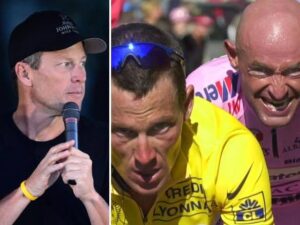Lance Armstrong, one of the most polarizing figures in sports history, has once again grabbed headlines by choosing to confront his controversial past head-on. In a no-holds-barred interview for an upcoming documentary series, the former seven-time Tour de France champion promises to leave “no stone unturned” as he opens up about the highs, lows, and defining moments of his tumultuous career.

The Rise of a Cycling Icon
Armstrong’s journey from a promising triathlete to the king of the Tour de France is one of the most remarkable stories in sports. After being diagnosed with stage four testicular cancer in 1996, he defied the odds by not only beating the disease but also returning to professional cycling to dominate the sport like never before.
From 1999 to 2005, Armstrong became the face of cycling, capturing the hearts of fans worldwide with his unmatched determination and relentless work ethic. His yellow jersey streak became symbolic of hope, resilience, and the unbreakable human spirit.
The Fall from Grace
However, Armstrong’s rise to the pinnacle of the sport was built on a foundation that would later crumble spectacularly. The whispers of doping that had haunted his career grew louder until they could no longer be ignored. In 2012, the United States Anti-Doping Agency (USADA) released a damning report, stripping Armstrong of his seven Tour de France titles and banning him from professional cycling for life.
The revelations shattered his once-heroic image, transforming him from a global icon into one of the most disgraced athletes in history. The fallout extended beyond his personal legacy, deeply impacting his charity, the Livestrong Foundation, which had raised millions for cancer patients worldwide.
In the upcoming series, Armstrong reportedly dives deep into the complex layers of his legacy, refusing to shy away from the hardest truths. He addresses his ruthless competitive nature, the toxic team culture that fueled his dominance, and the betrayal felt by fans and former teammates alike.
“I’m not here to win anyone back. I’m here to tell my side of the story, no stone unturned,” Armstrong says in the trailer, his tone a mix of defiance and self-reflection.
Despite his fall, Armstrong has spent the past decade trying to reshape his public image. His podcast, The Forward, has provided him a platform to reconnect with his audience, while his recent ventures into business and media have helped him stay relevant in the cycling world.
“I’m not the hero I once thought I was, and I’m not the villain many want me to be. I’m somewhere in between – just a flawed human like everyone else,” he admits in one of the series’ more introspective moments.
As Armstrong attempts to set the record straight, the cycling community remains divided. Some believe he deserves a shot at redemption, given his contributions to the sport and his impact on cancer awareness, while others argue that his actions permanently stained the reputation of professional cycling.
As the documentary’s release approaches, one thing is certain – the story of Lance Armstrong is far from over. Whether viewed as a tragic hero, a relentless competitor, or an unrepentant antihero, Armstrong’s place in the history of sports remains as complicated as ever
























